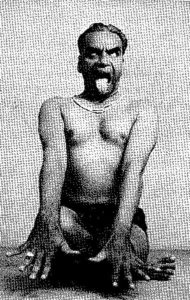emo yoga :: rage, fear, so sorry, etc


The last post talked a little bit about emotion from a classical Yoga standpoint. It may have been a little dry and unhelpful, especially if you do yoga to feel good rather than to achieve enlightenment. Most yoga practitioners today aren’t that interested in enlightenment (I’ve noticed that far more meditators practice with that aim than yogis), and that’s understood. In the late 19th and early 20th Cs, yoga was revived and transformed for the lay person, the householder. This opened the door for even more transformation when it arrived in the West, to the point that you hear anything and everything is yoga. Maybe. Maybe not.
Western psychology is very different from Indian, and the Self and emotions are viewed differently. (There are different views of emotion and Self within Indian philosophy and psychology, but they do tend toward a different, less individualistic view than in the West.) We often hear a mishmash of philosophies and psychologies when we walk into a Western-style class, which can be very confusing. Especially if you just went to your local gym for a stretch, you begin to feel hot with anger, and the teacher is telling you to feel the love blossoming from your newly-opened fourth chakra. What do you do with that?
As mentioned last time, for the yogi, emotions are something to be transcended. Compare this with the words of Carl Jung, the 20th Century psychoanalyst interested in consciousness and ways of being. His ideas tend to resonate with people interested in yoga:
“Emotion is the chief source of all becoming-conscious. There can be no transforming of darkness into light and of apathy into movement without emotion.”
For me, this resonates far more than transcending my emotions altogether, partly because I trained myself early on to repress emotions, to bury them to the point it can still be difficult for me to access how I feel, particularly if my ego deems them threatening. It’s a pretty common defense mechanism for Westerners, who preference image and the rational-cognitive mind above all else. If you haven’t felt your emotions, you can’t transcend them.
My biggest issue with the love and light spiel is that it encourages repression. This is why spiritual bypassing (“The use of spiritual beliefs to avoid dealing with painful feelings, unresolved wounds, and developmental needs” —Robert Augustus Masters) is such an issue. Take a person who isn’t comfortable with his emotions and tell him that he’s headed toward enlightenment if he transcends them. POOF! You have a person with little-to-no self awareness who sits on a cushion blissing out and avoiding half his life, because he skips that crucial early step of meeting and feeling his emotions.
So if yoga brings “a lot of neurotic thoughts and unmanageable emotions (particularly rage) more to the surface” (previous comment), that’s a good thing. Look at it. Feel it. Notice it. Anger can tell us a lot. Just as much as joy and bliss.
Since the So mUch Yoga and Still Such a Bitch post, I’ve had a number of conversations about rage, all with women. Thinking about it now, I should probably have more. It seems that this getting angry, shutting it down, then some time later exploding in violent rage, usually toward an intimate, over, say, taking out the trash, is almost ubiquitous. It’s common. I had no idea.
The maddening thing about this is that it’s impotent. If you freak out on a minor last straw, you are just a hysterical bitch. Your feelings and arguments are moot. You are out of control. Unfeminine. Too feminine. Bad. Shame on you. Take the shame and self-loathing, press it down and play nice. You were so wrong to throw the lasagna across the room like that. What is wrong with you!?
I am so sorry.
But I’m not.
Maybe you’ve noticed that this relationship with anger doesn’t work now, and didn’t work the last 1, 10, 100 times. But what else is there to do?
 The pattern does serve us well in one way. It keeps us from really facing our rage, which is far scarier than the anger, self-hate, and occasional melt-down we despise but are used to and comfortable with (if you don’t believe me, watch how much you resist changing your approach).
The pattern does serve us well in one way. It keeps us from really facing our rage, which is far scarier than the anger, self-hate, and occasional melt-down we despise but are used to and comfortable with (if you don’t believe me, watch how much you resist changing your approach).
So then how to face the rage?
I don’t know. What I have started to do is watch myself closely, and instead of judging it, just watch. It starts with irritation. Often it ends there, but sometimes not. I’ve noticed that I become extremely irritated when I feel someone has transgressed my boundaries. When someone is late, when a house guest reads over my shoulder (my god, some space and privacy, please!), when the neighbor blares pop music at 5:50am, even if I am awake. Do I respect other people’s boundaries? Of course I do! When I notice them and feel like it. Sometimes.
So, why do these human slights make me so irate?
Maybe it matters, maybe it doesn’t. I could go back to childhood or family patterns, and that’s probably helpful in some ways, but what’s really interesting is just noticing. I’m getting irritated. I’m getting angry. What does that feel like? Where is it coming from? As soon as I go into story or analyzing, I try to go back to not knowing and just feeling what’s there. Where is it in my body? What does it feel like? Is there sensation? Is it constant? Does it move or change?
One thing I like to do when I get close to the heat is shift my attention to someone I love, a funny moment, a fuzzy, loving feeling that floats me far away from the hot, sticky pull of anger. That feels so nice! But it’s cheating. It takes me away from what I’m afraid to feel, leaving it underneath to do God knows what.
There is something bigger there. Something as yet untouched. I feared it before but it’s beginning to be a little more okay. The fear is still there, though, more conscious than the rage. But the more I play with this, the less wrapped up I feel in it. The more I feel my anger, the less I react to it. Recently a friend apologized for something that would have angered or hurt me before. But I wasn’t angered or hurt. I understood where she was coming from, though it’s a different place than I inhabit. When she apologized, I’d totally forgotten the incident. I was able to say, honestly, clearly, “Oh, no worries, I totally understand,” in that way we hope to say it (like we mean it) when we want to feel that way because we know we should, but don’t. I watched that exchange. It felt really nice.
Of course, that’s still rare. I still get angry and overreact. I still hover over something unacknowledged. I don’t know.
As with the Jung quote above, the Western psychological perspective on emotion is often that if felt and listened to, it will tell you something valuable. Lead you somewhere you need to go. This strikes me as crucial to our time because most people care so much more about their image than about how they feel. We’re afraid of our emotions because if felt and respected, they may lead us down a road that’s not acceptable, cool, or in line with what we thought we wanted, with what our ego wants. If we avoid this with some spiritual bypassing, we’re missing the point, and our lives.
Great article! I included it in my daily lunch link post, here:
http://diogenesdoggery.wordpress.com/2013/08/20/lunch-link-love-4/
I also write on similar topics (though haven’t posted much of that yet to the blog). I encourage anyone interested to follow the blog on Facebook. Only 2 or 3 posts in your news feed each day, lots of good links and some emotionally/psychologically/philosophically challenging content: https://www.facebook.com/diogenes.doggery/
Thanks. Regarding the pingback (first comment), while I’m beyond charmed to be mistaken for a New Yorker writer, this blog is in no way affiliated with the New Yorker. I just loved the cartoon (almost as much as Daryl’s). I couldn’t find the cartoonist to credit, but did link the image back to the inimitable New Yorker.
I just read this. So good, and answers the question that seems most important, which is: what is the skillful thing to DO with anger? To be able to feel it strongly is a blessing – not something to waste.
There was another blog on this topic this week, posted two days after yours, using two bits of language that you use above – about being too feminine, and about anger erupting towards an intimate. It also uses the same Iyengar photo you use. Is there some connection between these two posts?
http://www.returnyoga.org/2013/08/21/rage-fear-sadness-fatigue-and-yoga-the-yoga-of-darkness/
Wow, Owl. Wow. As with the other (more intimate) likenesses, she took that image directly from my page. How do I know? I renamed it lionrage. It doesn’t exist elsewhere on the internet by that name.
When otherwise speechless I will resort to preaching.
YS II.37
अस्तेयप्रतिष्ठायां सर्वरत्नोपस्थानम्॥३७॥
Asteya pratisthayam sarva ratna upasthanam
To one established in non-stealing come the gems.
Thank you, Owl. xoxo
It’s on YogaDork, too. All the rage: http://yogadork.com/2013/08/29/rage-fear-sadness-fatigue-the-yoga-of-darkness/
Karin,
Thank you for your comment, kind words, and apology. I wish I could believe that you came about the image from a google search, but as I stated at yogadork, the image on your blog, called lionrage.jpg, is not searchable by the words “I*****r,” “L**n,” “B****h,” or anything remotely similar. You could not come upon my blog by searching specifically for that image, as those words are not connected to the image or post in any way. [This comment could change that, so I later blotted out the words above.]
I was eager to find this a coincidence, as both Angela and Carol know from our discussions about this. But when I saw the name of the image on your blog post (which happened while I was chatting with Angela), I knew you had to have seen my work, posted only two days earlier.
I rename my images so they are not easily searchable by description, so others don’t drag down my server by linking directly to my site. That image is called lionrage only on my site, your site, and yogadork.
As both Carol and Angela point out, there are just too many similarities. And too many improbabilities for you to have not seen my site before you posted yours. That you did not cite me is problematic. This could have been a lovely exchange and building upon of ideas. It’s disappointing it didn’t work out that way.
~Anastasia